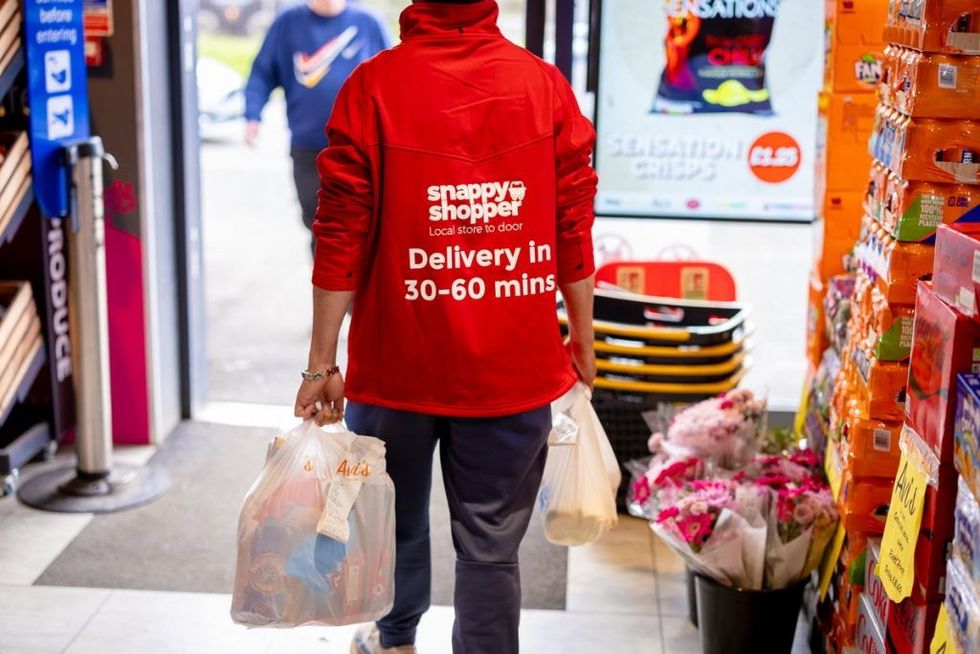Quick delivery is no longer a luxury or a gimmick, it’s the clear roadmap to profitability and a guaranteed route to expansion for convenience stores aiming to increase turnover, finds Asian Trader.
For decades, convenience stores have thrived on their ability to provide instant access to essentials. Propelled by Covid lockdown and changes in habits, the consumers’ definition of convenience now also includes within-minutes delivery at home.
Currently, between physical and online stores, the physical option remains the most prominent, although with the increased popularity of rapid grocery delivery services, shoppers today are comfortably open to the idea of buying groceries and food online to save time and hassle.
In fact, the penetration of Brits shopping online for food and other groceries has nearly doubled since 2016. The UK grocery delivery market is projected to skyrocket to £31.38 billion by 2025, a clear indicator of where consumer preferences are weighted.
While 59 per cent of Brits prefer to buy their groceries in-person at a traditional storefront, the rest of the consumers are open to shop either online or in-stores, shows Statista’s recent data, signifying the huge pool to tap into.
The last edition of Asian trader explored how the convenience sector is seeing a dip contrary to the overall grocery retail movement. Among the many measures discussed that can arrest this trend, delivery emerged as one of the ways forward.
In fact, many retailers with a keen focus on the delivery side are reaping some great benefits.
Just like retailer Natalie Lightfoot whose store Londis Solo Convenience Store in Glasgow has doubled sales since launching a delivery service.
She now services about 85 delivery orders each day from her 620-square-foot store.
“For me, since growth couldn't happen through physical expansion, I decided to just start bringing the store to customers’ doorsteps.
“The customer on the end of the order line doesn't care what the size of the store is, as long as he is getting what he ordered well in time,” Lightfoot told Asian Trader.
With delivery accounting for 40 per cent of her sales, Lightfoot is confident that rapid delivery is the way forward.
In Middlesex, Londis retailer Atul Sodha shares similar sentiments. As shared previously with Asian Trader, he feels that online quick delivery expanded his store’s reach to people who wouldn't normally visit it.
Clearly, rapid delivery can elevate c-stores expand beyond physical limitations thus increasing sales and turnover.
By placing indie stores on the digital map, the platforms like Snappy Shopper, Deliveroo, and Just Eat are now leveling the playing field.

These platforms help convenience stores bridge the gap between local service and professional-level logistics, fielding them on the same playing field as major grocery delivery players such as Sainsbury’s Chop Chop, Asda Express Delivery, Tesco Whoosh, and Ocado Zoom.
In Wellingborough, when retailer Biren Patel thought to start a delivery service during Covid at his Budgens Berrymoor store, he wanted to do it in a “professional way”. After a quick consideration of all the platforms, he decided to join Snappy Shopper.
Results started clocking up immediately.
“Deliveries added another chapter in my store’s turnover. Snappy Shopper helped me to sell not just locally, but about five miles down the road; I otherwise would never have got those customers.
“Snappy Shopper has been very supportive. Their promotions, tie-up with different brands and suppliers helps us compete with the big boys,” Patel told Asian Trader.
Budgens Berrymoor now has a dedicated bespoke branded car for delivery with staff doing the rounds from eight in the morning until eight o'clock at night.
Sweet Success
Meanwhile in Glasgow, retailer Girish Jeeva is taking his store’s delivery service to another level altogether.
The owner of Girish's Premier Barmulloch, in collaboration with Snappy Shopper, has recently launched a 24-hour delivery service, the first of its kind in Scotland.
It has been just a month since the launch, but the response, he says, has been “phenomenal.”
Jeeva shared with Asian Trader, “We started the delivery service about two years ago since we saw a market for it. We have been doing great since the start.”
Jeeva’s store’s growth was not accidental. He has been strategic, investing in two eye-catching, vibrant wrapped cars, which turn vehicles into moving billboards, reaching potential customers across a wide geographical range.
Zooming around the town or even in the parking lots, such well-designed car wraps work as a great marketing tool as they attract attention while the eye-catching graphics increase brand recognition and recall.
He also employs 10 drivers throughout the week, with five on standby, ensuring that the service remains smooth without affecting in-store operations.
Elevating the delivery service to 24-hour service came to Jeeva as an epiphany.
“I was thinking what new I should do in 2025. It was mid-January and then it struck me to try 24-hour delivery.
“We already have night shift staff for refilling and stocking. All we needed to do was to bring in a driver and turn on the Snappy Shopper device,” he said.
What started as an experiment quickly exceeded expectations. The store did 29 orders the very first night. It now gets about 27 to 28 orders per night with the highest until now being 39 orders.
“We were aiming for five to six deliveries more in the night hours. To our surprise, it’s going faster than we expected. The first week, we generated almost £5000,” he said.
Although Jeeva remains committed to in-store sales and in boosting the shopping experience as well, delivery is going to be his special focus area for the coming times.
Considering that delivery accounts for about 20 per cent of the store’s sales, there is still a huge room for growth.
Jeeva’s light-bulb moment, coupled with his bold move, might have opened a new channel for convenience stores.
Retailer Daniall Nadeem, who runs Spar Motherwell Road in Belshill, soon followed Jeeva’s footstep, joining him as trailblazers in convenience retail.
When it came to venturing into deliveries, Snappy Shopper has been fast emerging as an obvious choice for many retailers. The platform now has more than 2000 stores, a 40 per cent increase from last year.
The platform is being favoured by c-store retailers majorly owing to its unprecedented weekly trading, immense marketing support, and soaring customer adoption.
In 2024, Snappy Shopper saw weekly trading volumes surge by 42 per cent, marking the platform’s most significant growth since the surge in demand during the Covid-19 pandemic in 2020.
As stated by Snappy Shopper CEO Mike Callachan, the dominant key trend seen in Snappy Shopper stores is that their home delivery business grows more quickly than in-store sales, allowing the retailer to win lots of new customers.
During December, Hayat’s Premier Store, based in Dundee, hit the milestone of more than £200,000 worth of grocery deliveries in a single month. At the time, the store was doing more deliveries per hour than the nearby supermarket!
Inside issues
While it seems all rosy and easy, having rapid delivery service comes with its own set of challenges like labor shortages and stiff competition.
For retailers like Jeeva, the biggest challenge is the availability of skilled delivery drivers. Before getting his own bespoke branded cars, the retailer used to hire drivers who used their own cars which in turn used to create many logistical issues.
Having his own cars ironed out hiccups to a lot of extent but availability of drivers remains a concern for Jeeva.
"It's really hard to find reliable drivers,” he said.
“Now with two cars of my own, if something goes wrong while enroute to delivery, there is always extra vehicles available for the drivers to jump in and take care of the matter and get the orders to customers,” explained Jeeva.
Staff training for the delivery orders is another tricky part since being visible online, there is no room for mistakes.
Jeeva shared with Asian Trader, “When it comes to picking and packing the products, we only trust our well-trained and experienced staff who has a good understanding of the products.
“A single mistake can have huge impact in this model as it impacts the store’s reviews. We have to make sure that whoever is doing it is picking the product is the perfect person fit to do that.”
Patel will agree with Jeeva here as he also remains extra careful about his orders and online store reviews.
“Delivery is good, but it has to be done at the right time in the right way. It has to be looked after; you can’t just set it up and leave it,” he said.
Patel takes pride in his store’s delivery service and boasts of having loyal online customers for over five years.
He explained, “We take extra care with delivery customers, like if we get an order and we don’t have one thing, we call and ask for replacements rather than removing it from list or adding something from our side.”
On the other side of the coin, small average order sizes coupled with high operational costs means that profit remains a challenge for rapid grocery companies.
Sharing some of the concerns, Michael Watt, Regional Growth Manager at Snappy Shopper, told Asian Trader, “The challenges Snappy face is the competition from larger supermarkets and wholesalers who now want a slice of the q-commerce market.
“Tesco are rolling out Whoosh and other supermarkets are partnering with providers like Deliveroo and Uber Eats to offer grocery delivery.
“We believe in our mission of levelling the playing field for independent retailers to be able to compete and even outmaneuver these bigger players.”
Next level
Despite the challenges, Callachan is optimistic about the role of delivery in c-stores.
“The physical sales in-store are always limited and dependent on passing traffic and footfall whereas home delivery can always reach new customers via massive platforms such as Facebook and TikTok.
“We continue to innovate and have some very exciting new features in the app coming, the most recent being a host of features to support retailers to launch a 24-hour service which again can radically increase sales for the retailer,” he added.
Jeeva, Lightfoot and Patel echo a similar takeaway, that if a convenience store wants to take the sales to the “next level”, they need to join a platform for rapid delivery.
As they like to put it, “With home delivery, we are taking the products to the customers, not waiting for the customers to come to our stores”.
Aiming high, Jeeva is optimistic about 2025.
“There is definitely a huge potential and with a supportive platform like Snappy Shopper, the possibilities are endless.
“With 24-hour delivery service in place, I am aiming to touch £30,000 a week sale this year, which will take our whole store turnover to £100,000 week, something that I could not have thought otherwise,” he concluded.
Clearly, rapid delivery, with its promise of growth and extra sales through with minimal input and maximum output, seems to be the sure short way forward for c-stores.




